|
|
|
Sort Order |
|
|
|
Items / Page
|
|
|
|
|
|
|
| Srl | Item |
| 1 |
ID:
178537


|
|
|
|
|
| Summary/Abstract |
2019 marked the 25th anniversary of normalizing Jordanian-Israeli relations and the ‘warm’ peace-making between the two countries. Representing key partners and neighbours in the Middle East, Jordan and Israel have maintained political and economic ties since 1994. The pro-Western stance of both countries, and their common interest in maintaining regional stability, led Jordan and Israel to pursue similar foreign policy aims regarding various regional upheavals, as well as the Palestine-Israeli dispute. Jordanian-Israeli relations have, however, been caught amidst shifts in the US’s Middle East Policy under the Trump administration, which has raised questions over the status of Jerusalem and the West Bank. With respect to these developments, this article argues that the disaccord between the US/Israel and Jordan over these two places reveals that a politics of identity remains a pillar of the Kingdom’s stability and survival. Although both countries are being confronted with the same regional challenges, particularly in the wake of the war in Syria, the re-emergence of the rhetoric of ‘Jordan is Palestine’ – which poses the country as an alternative homeland for Palestinians (al-watan al-badil) – nowadays constitutes the top security concern for the Hashemite monarchy, and has the potential to undermine Jordanian-Israeli relations going forward.
|
|
|
|
|
|
|
|
|
|
|
|
|
|
|
|
| 2 |
ID:
123032
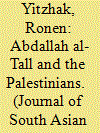

|
|
|
| 3 |
ID:
051449
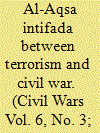

|
|
|
| 4 |
ID:
052726
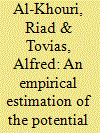

|
|
|
| 5 |
ID:
086333
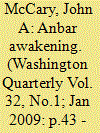

|
|
|
|
|
| Publication |
2009.
|
| Summary/Abstract |
The now-deceased leader of the Anbar Awakening, Sheikh Abd al Sittar Abu Reesha, once said, "Our American friends had not understood us when they came. They were proud, stubborn people and so were we. They worked with the opportunists, now they have turned to the tribes, and this is as it should be."1
Until 2007, the most violent region of insurgent attacks against U.S. forces in Iraq had been al Anbar, the largely rural, expansive western province stretching from the outskirts of Baghdad to Iraq's lengthy, mostly unsecured desert borders with Sunni-dominated Jordan, Saudi Arabia, and Syria.2 In what is most easily described as a marriage of convenience, Sunni insurgents and foreign Sunni al Qaeda fighters in al Anbar had formed a strategic and tactical alliance against what was perceived as an occupation by the United States or, more pointedly, against the occupation of a Muslim land by a largely Christian force, a deep affront to traditional Muslim values harkening back to the Crusades of the Middle Ages.3 Iraqis in al Anbar provided local knowledge, logistics, and up to 95 percent of the personnel, while experienced foreign al Qaeda fighters provided training, expertise, and financing. The pitch was simple: "We are Sunni. You are Sunni. The Americans and Iranians are helping the Shi'a - let's fight them together."
|
|
|
|
|
|
|
|
|
|
|
|
|
|
|
|
| 6 |
ID:
138297
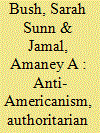

|
|
|
|
|
| Summary/Abstract |
A pillar of American foreign policy in the Middle East since September 11, 2001, has been promoting democracy, with particular emphasis on support for women's representation. Given high levels of anti-Americanism in the region, does foreign pressure for policy reform undermine this project? Evidence from a nationally representative survey experiment in Jordan shows that an American endorsement of women in politics has no average effect on popular support for women's representation. Instead, domestic patterns of support and opposition to autocrats determine citizens' receptivity to policy endorsements, with policy endorsements of foreign-supported reforms polarizing public opinion. Both foreign and domestic endorsements of women in politics depress support among Jordanians who oppose their regime significantly more than among Jordanians who support it.
|
|
|
|
|
|
|
|
|
|
|
|
|
|
|
|
| 7 |
ID:
100074
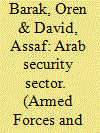

|
|
|
|
|
| Publication |
2010.
|
| Summary/Abstract |
This article discusses the lack of adequate attention to the Arab Security Sector and its complex political and social roles in the Arab States and presents the contours of a new research agenda for this topic. First, the authors demonstrate the insufficient scholarly attention accorded to the Arab Security Sector in several academic publications in the fields of Middle East Studies and Security Studies in the period 1990 -2005. Second, they focus on three major areas where recent theoretical and comparative advances in the study of civil-military relations have not been paralleled in the study of the Arab Security Sector: (1) the role of the Arab Security Sector in the process of state formation; (2) informal connections between actors within the Arab Security Sector and actors operating in the political system; and (3) the role of the Arab Security Sector in reflecting and reinforcing patterns of intersectoral relations in the Arab States.
|
|
|
|
|
|
|
|
|
|
|
|
|
|
|
|
| 8 |
ID:
110117
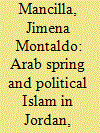

|
|
|
| 9 |
ID:
110161
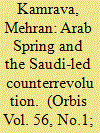

|
|
|
|
|
| Publication |
2012.
|
| Summary/Abstract |
The author contends that the Arab Spring has provided an opening for the Gulf Cooperation Council as a group and for Saudi Arabia as a long-time aspiring leader of the Arab world to try to expand their regional influence and global profile. An already weakened Arab state system, he argues, has been once again weakened by the sweeping wave of rebellion.
With its final chapter yet to be written, the Arab Spring of 2011 is likely to go down in history as a season of profound political changes that swept across the domestic politics of the Arab world. Even at this preliminary stage, that much is clear. What remains unclear, however, is how political change sweeping across the Middle East and North Africa is likely to alter the international relations of the Arab world in general and, in particular, the larger regional position and specific policy preferences of the Gulf Cooperation Council (GCC). Important considerations include the GCC's posture and profile vis-à-vis the Arab Spring, its collective reaction to the region-wide movements for political change, and its delicate relationship with its two troubled neighbors to the north, namely Iran and Iraq.
While the Arab Spring is unlikely to result in meaningful changes in Iran and Iraq's relationships with the GCC, it has fostered two discernible trends in the larger Arab world. First, Saudi Arabia has sought to reassert its position of prominence and leadership within the GCC. In fact, the kingdom has positioned itself as the chief architect of a counterrevolution to contain, and perhaps to even reverse, the Arab Spring as much as possible. Second, and an outgrowth of the first development, is the GCC's attempt to solidify its identity and mandate through the inclusion of additional Sunni monarchies-Morocco and Jordan-as a counterbalance, if not a substitute, to the Arab League.
|
|
|
|
|
|
|
|
|
|
|
|
|
|
|
|
| 10 |
ID:
115329
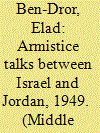

|
|
|
|
|
| Publication |
2012.
|
| Summary/Abstract |
The article examines the armistice talks between Israel and Jordan (March-April 1949) from the perspective of the UN mediator, Ralph Bunche, who coordinated them. The period described was stormy and complex: at its start, Israel took control of the southern Negev. Later, the two countries conducted formal talks in Rhodes, under Bunche's watchful eye, in parallel to informal negotiations, without UN involvement, in Jordan. The article, based to a large extent on Bunche's unpublished diary, explains why Bunche, who maintained rigorous control of all of the other armistice talks, behaved differently in this case, giving his post factum seal of approval to the Israeli takeover of the southern Negev and allowing Israel to pressure Abdullah to hand over the Triangle. The thesis is that Bunche, who could have put an end to the talks by resigning, or drawn the US into the crisis (as he did in the other rounds of negotiations), recognized the complexity of the relations between Israel and Abdullah and chose to act in a way that would prevent a new eruption of hostilities. In effect he was protecting Abdullah, who would have been likely to lose the West Bank to Israel in another round of fighting.
|
|
|
|
|
|
|
|
|
|
|
|
|
|
|
|
| 11 |
ID:
095405
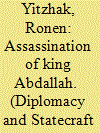

|
|
|
|
|
| Publication |
2010.
|
| Summary/Abstract |
King Abdallah was assassinated as a result of his relationship with Arab leaders. The opposition included three leaders: the Mufti Hajj Amin al-Huseini, King Faruq and Ibn Saud. Jordanian intelligence knew about the conspiracy and warned King Abdallah, but he decided to visit Jerusalem as originally planned and there he was assassinated. After the assassination on 20 July 1951, the Jordanian government was faced with two dangers that threatened the Hashemite regime in Jordan. The first, a Palestinian rebellion the purpose of which was the replacement of the Hashemite regime with a Palestinian one; the second an invasion of Jordan by either Syria or Saudi Arabia or both countries together, and their possible control of it. However, the dangers turned out to be neither tangible nor serious and the Hashemite regime remained in power.
|
|
|
|
|
|
|
|
|
|
|
|
|
|
|
|
| 12 |
ID:
160036
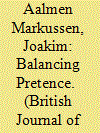

|
|
|
|
|
| Summary/Abstract |
King Hussein of Jordan was often at odds with his less conciliatory counterparts in the Arab world. He was one of the few Arab leaders who engaged and communicated with Israel. The administration of US President Lyndon B. Johnson wanted to ensure the continuation of Hussein’s moderate line towards Israel and sold weapons to Jordan. However, providing military support to an Arab state when the vast majority of Americans favoured Israel involved significant political costs. As the Johnson administration saw it, openly favouring only Israel would negatively affect the USA’s position and interests in the Arab world. Therefore, Johnson pursued a policy of seemingly balancing Israeli and Jordanian interests. This article argues that the USA supported Jordan primarily to ensure Israel’s security, but ultimately, the Johnson administration lacked the will and understanding to properly address Jordan’s concerns and failed to prevent King Hussein from joining the Arab side of the 1967 War against Israel.
|
|
|
|
|
|
|
|
|
|
|
|
|
|
|
|
| 13 |
ID:
188647


|
|
|
|
|
| Summary/Abstract |
Even before the Arab Uprising waves, the grievances of increased demands on services and subsidies, shifting economic policy, the deteriorating core-periphery relations between Amman and erstwhile major centers in the Jordanian hinterland (e.g., al-Karak, Maʿān, al-Ṭafilah) have all characterized one aspect of the delicate balance of power in the Hashemite Kingdom. This article will examine the nature of this deterioration, and how the monarchy has variously conceded to, repressed, and thereby withstood repeated protests emanating from the hinterlands. Finally, this article examines a case study of the city of Maʿān as a bellwether hub of popular protest in Jordan.
|
|
|
|
|
|
|
|
|
|
|
|
|
|
|
|
| 14 |
ID:
180002
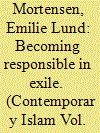

|
|
|
|
|
| Summary/Abstract |
Taking an ethnographic point of departure in the stories of three Syrian middle-class men in Amman, Jordan, in this article, I zoom in on the role of care in the everyday of exile, as I explore the young men’s attempts to be “responsible” young men despite challenging circumstances. Guided by Ahmed’s (2006) notion of lifelines, defined as those which direct us and allow us to find our way (ibid.: 12–14), I demonstrate how gendered norms and notions became objects of reflection and experimentation in exile, both enabling and forcing the young men I worked with to think through other ways of leading life as a man. Finding further inspiration in Naguib’s (2015) and Ghannam’s (2013) works on masculinity and care in the Middle East, I consider care as central to the process of negotiating a masculine identity in general as well as to the reconfiguration of a meaningful masculine position in exile specifically.
|
|
|
|
|
|
|
|
|
|
|
|
|
|
|
|
| 15 |
ID:
186578
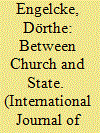

|
|
|
|
|
| Summary/Abstract |
In most Middle Eastern jurisdictions, the applicable family law is determined based on the religious affiliation of the parties involved. Whereas Jordanian Islamic family law has last been reformed in 2001, 2010, and 2019, and the law that regulates the shariʿa courts has been amended several times since 1972, the family laws of Christian communities and the church courts have largely been exempted from this reform dynamic. Based on semi-structured interviews as well as the review of written sources, this article investigates why it is difficult to reform the church courts and even more difficult to reform the family laws of Christian communities, using the Greek Orthodox community in Jordan as a case study. I argue that conflicts within the Greek Orthodox Patriarchate of Jerusalem and the fact that the jurisdiction of the patriarchate over family law transcends Jordanian state boundaries have made state-led reform challenging and presented obstacles for Jordanian Christians lobbying for change.
|
|
|
|
|
|
|
|
|
|
|
|
|
|
|
|
| 16 |
ID:
064971
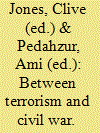

|
|
|
|
|
| Publication |
London, Routledge, 2005.
|
| Description |
vi, 141p.hbk
|
| Standard Number |
0415348242
|
|
|
|
|
|
|
|
|
|
|
|
Copies: C:1/I:0,R:0,Q:0
Circulation
| Accession# | | | | | | | | | | | |
| 049915 | 956.953044/JON 049915 | Main | On Shelf | General | | | | | | | |
|
|
|
|
| 17 |
ID:
144288
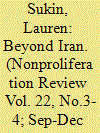

|
|
|
|
|
| Summary/Abstract |
Several states in the Middle East have noted their interest in nuclear energy programs, but current cost and timeline estimates understate the difficulties that these states will face. A state-level analysis of nuclear development capacities in Saudi Arabia, Egypt, Jordan, Turkey, and the United Arab Emirates suggests that building nuclear infrastructure in the region will, in fact, be a lengthy and expensive endeavor, due to concerns such as export constraints, public opposition, a lack of human resources, and high overhead costs. This has implications for nuclear weapon nonproliferation: first, fears that these developing nuclear energy capabilities may facilitate possible weapon proliferation are premature, and second, there is time to ensure that any burgeoning nuclear infrastructure in the region remains safe and civilian in nature.
|
|
|
|
|
|
|
|
|
|
|
|
|
|
|
|
| 18 |
ID:
082494
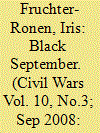

|
|
|
|
|
| Publication |
2008.
|
| Summary/Abstract |
Soon after the 1967 War, the Palestinian Resistance Movements (PRM) which established themselves in Jordan challenged Jordan's authority presenting a military and even existential threat to Hashemite rule. The prestige of the fedayeen as the primary torchbearers of the struggle against Israel rose dramatically following the Karameh Operation of March 1968, which was perceived as a military victory by the PRM and entrenched its legitimacy. The period between the Karameh raid and September 1970 was characterized by the strengthening of the fedayeen organizations and their entrenchment in Jordan by means of the establishment of autonomous military, political, and social institutions. The bloody events of September 1970-July 1971 induced a change in Jordan's official ideological line and marked a significant step in the coalescence of Jordanian national identity. From then on, the particularist trans-Jordanian identity in Jordan was emphasized more explicitly, along with such other attributes of this identity as Bedouin tribal identity, Islamic identity, and Hashemite identity
|
|
|
|
|
|
|
|
|
|
|
|
|
|
|
|
| 19 |
ID:
027124


|
|
|
|
|
| Publication |
London, Hamish Hamilton, 1972.
|
| Description |
xvi, 179p.hbk
|
| Standard Number |
24102143X
|
|
|
|
|
|
|
|
|
|
|
|
Copies: C:1/I:0,R:0,Q:0
Circulation
| Accession# | | | | | | | | | | | |
| 011087 | 956.95/JOH 011087 | Main | On Shelf | General | | | | | | | |
|
|
|
|
| 20 |
ID:
151681
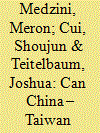

|
|
|
|
|
| Summary/Abstract |
‘Cross-Straits Relations’ is the title given by the protagonists to the relations that evolved in the past 20 years between Taiwan and the People’s Republic of China. Designed to create confidence-building measures and trust and avoid military confrontation in a frozen, abeyant intractable conflict, these ties have grown enormously in trade volume, investments and people’s exchange. The following article poses the question of whether such relations between two hostile regimes might serve as a model for future conflict management of the hot and active intractable conflict between Israel and the Palestinian Authority, and eventually the Arab countries with which Israel does not yet have peace treaties.
|
|
|
|
|
|
|
|
|
|
|
|
|
|
|
|
|
|
|
|
|